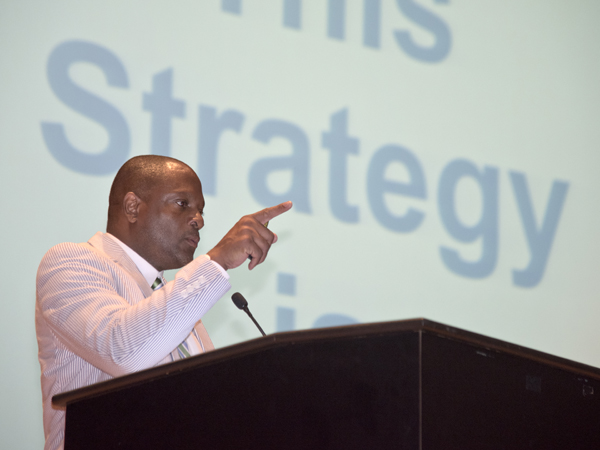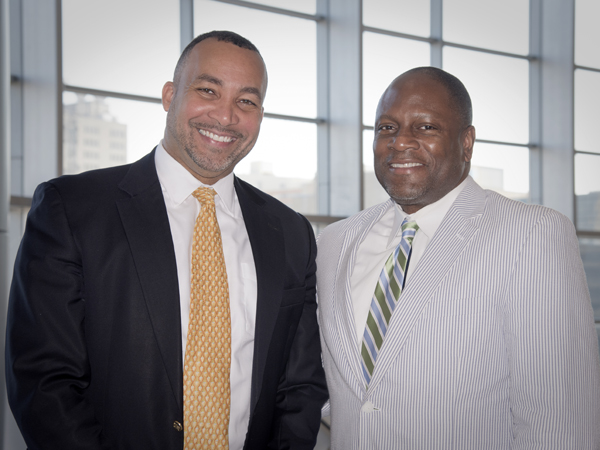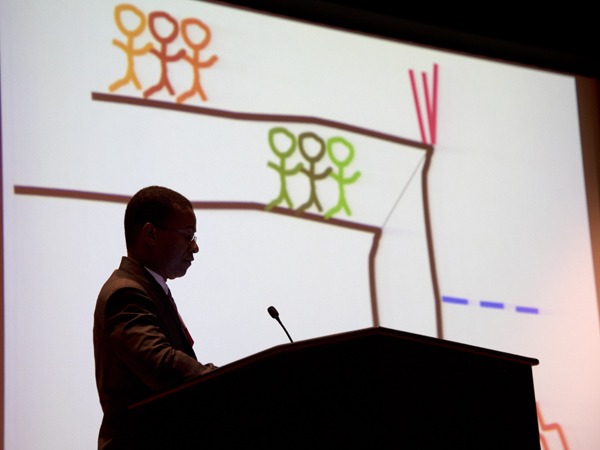White House AIDS czar crusades for universal prevention, care

Published in News Stories on September 28, 2015
The president's top advisor in the fight against the spread of HIV/AIDS said Friday that the nation has a "moral imperative" to provide the keys for prevention and care to those who are locked out.
Douglas M. Brooks, the director of the Office of National AIDS Policy and the lead speaker at the Third Minority HIV and Health Disparities Conference, told his audience at the Jackson Convention Complex that the science behind HIV/AIDS treatment is clear on what works.
"Now we must figure out how to get people access to it … to high-quality, life-extending care free from stigma and discrimination."
Brooks was one of several authorities who addressed the conference sponsored by the Medical Center, the Elton John AIDS Foundation and the Southeast AIDS Training and Education Center, which includes the UMMC AIDS Education and Training Center.

Mena, left, and Brooks
Targeted to nurses, nurse practitioners, pharmacists, physicians, physician assistants and social workers, the continuing medical education event was timed to fall near the Sept. 27 observance of National Gay Men's HIV/AIDS Awareness Day, meant to bring attention to the disproportionate number of gay and bisexual men affected by HIV/AIDS, said Dr. Leandro Mena, associate professor of medicine in UMMC's Division of Infectious Diseases.
"We hope people will leave the conference looking at our HIV epidemic through the lens of health disparities, to use that as a framework for priorities to end the HIV epidemic," said Mena, who also serves as the director of the Center for HIV/AIDS Research Education and Policy at the Myrlie Evers-Williams Institute for the Elimination of Health Disparities, and who presented opening remarks to the estimated 200 in attendance.
In addressing the conference, the experts were asked to apply those priorities to the disparities that plague the South, where, Mena said, "we have unique challenges."
As a representative of the White House, Brooks laid out the Obama administration's 2015-2020 strategy to confront the obstacles to HIV/AIDS care and prevention. That plan includes harnessing the benefits of the Affordable Care Act (ACA).
Referring to the ACA, or Obamacare, Brooks said, "The full benefit of that legislation is not here. I stand in a place where Medicaid was not expanded," he said, citing Mississippi's denial of expansion as a barrier to access.
"But we are aware of your efforts. … Your commitment is beautiful," he said to the gathering. "We are grateful for what you are trying to do for your fellow Mississippians."
The state is part of a region, the South, with the highest rate of new HIV infections. Across the country, African-American gay and bisexual males ages 13 to 24 are two times more likely to be infected than any other group of young men having sex with men.
Exposure to treatment, especially for young African-American gay men, is often confounded by poverty, homelessness, homophobia and stigma, Brooks said.
Proof of that stigma, he said, occurs when "people are afraid to take their medication in front of their friends … when a woman is afraid of revealing her status because she may be beaten or removed from her home."
Answers include offering widespread HIV testing and linkage to care, broad support for those living with HIV, universal viral suppression of the disease for those living with it, and full access to HIV prevention methods known as pre-exposure prophylaxis (PrEP).
"It's our responsibility to make sure the nation knows these things," Brooks said.
"The vision is that the U.S. will become a place where HIV infections are rare ... ."
Representing the Centers for Disease Control and Prevention, Dr. Wayne Duffus followed Brooks by exploring in detail disparities (a difference in numbers) and inequities (unequal access) in health.
Education and income have a significant influence on one's health, said Duffus, associate director of health equity at the CDC's National Center for HIV/AIDS, Viral Hepatitis, STD and TB Prevention.
"Go to school and get money," Duffus said. "If you learn anything from this conference, it's those two things."
Life expectancy also rises with income among all races and ethnic groups, he said. But there is still a significant lag between blacks and whites.
"Why should there be a difference in the greatest country in the world?"
In spite of higher income and education, minorities, particularly African Americans, still suffer poorer health than their white counterparts, Duffus said.
Referring to the persistence of racism, Duffus said health is also affected by how a person is treated by its culture. For instance, people are told to move, to get exercise for their health, he said, but "if you go out and run, you don't know if you'll get shot."
Brooks and Duffus were part of a lineup of experts whose "prominence" attracted interest to the forum well beyond Mississippi's borders, Mena said.
"This is not just a state conference, but a regional one," he said. "We have people attending from all over the country."

For details on the Office of National ADIS Policy's updated strategy, go to www.whitehouse.gov/ONAP.
Other conference speakers

Wayne Dufuss, director, Office of Health Equality
Greg Millett, vice president and director, public policy, amfAR, The American Foundation for AIDS Research
Dr. Kenneth Mayer, infectious disease attending physician and director of HIV Prevention Research, Beth Israel Deaconess Medical Center; professor of medicine, Harvard Medical School; medical research director, the Fenway Institute, Fenway Health
Jeffrey S. Crowley, distinguished scholar and program director, National HIV/AIDS Initiative, O'Neill Institute for National and Global Health Law, Georgetown Law
Dr. Harvey Makadon, director of the National LGBT Health Education Center, clinical professor of Medicine at Harvard Medical School, National LGBT Health Education Center - The Fenway Institute
Dr. June Gipson, president and CEO, My Brother's Keeper Inc./Open Arms Clinic
PANELISTS: Dr. Amy Nunn, associate professor of public health and medicine, Brown University; Dr. Thomas Dobbs, state epidemiologist, Mississippi State Department of Health; Dr. Harvey Makadon; Jeffrey Crowley and Dr. Kenneth Mayer


